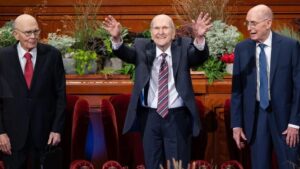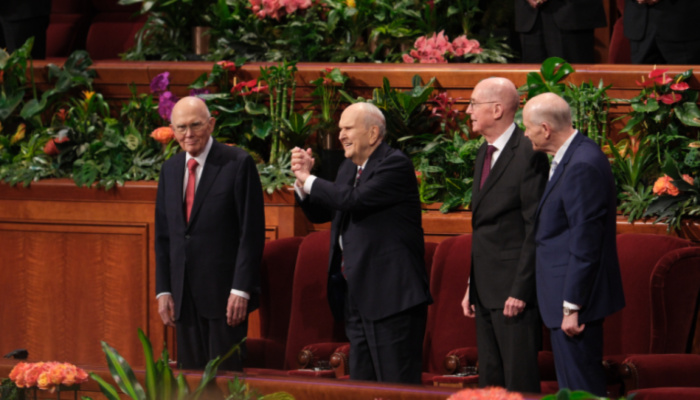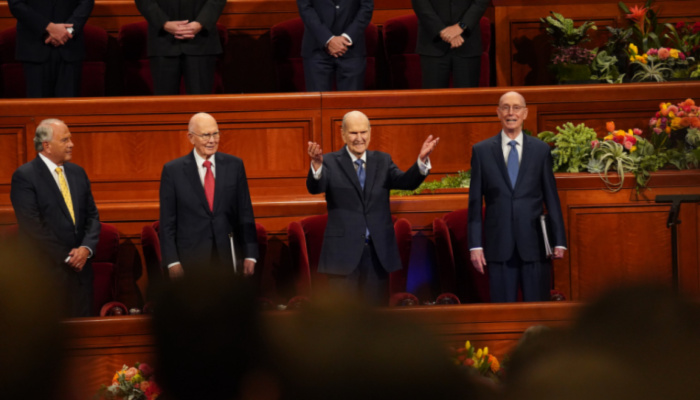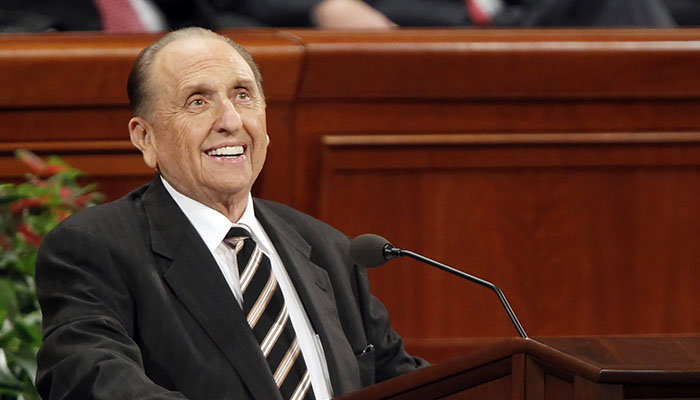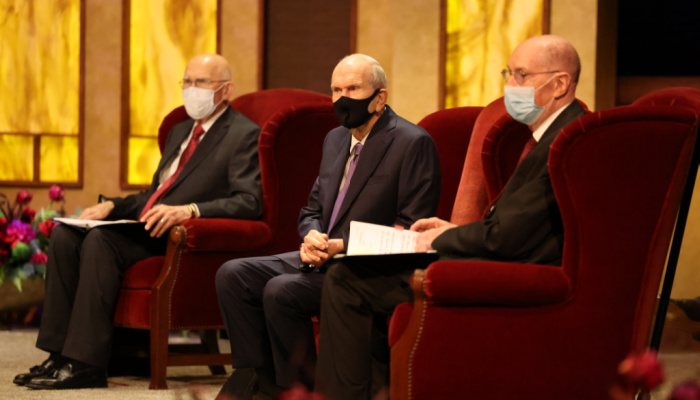
URGENT: What the Prophet Wants Women to Know Before General Conference
Over the past six months following President Nelson’s talk “Spiritual Treasures,” and the policy change that allows women to be witnesses of baptisms and sealing ordinances, I’ve noticed the many new posts and videos about women and the priesthood. One of the most notable for me was Barbara Morgan Gardner’s 5-minute Fireside, along with the First Presidency announcement in November that the Saturday session will not be a priesthood or general woman’s session, but for all members of the Young Women and Relief Society, and all holders of the Aaronic Priesthood and the Melchizedek Priesthood.
During this time of social distancing and suspension of all church gatherings, I have often thought about those who are trying to hold church services but do not have someone in their home who is authorized to administer the sacrament. I worry about the exposure these members may have in order to receive the sacrament. There are many wards whose boundaries cover vast distances, making it difficult for those to be able to partake in the sacrament ordinance during these stay-at-home mandates.
Today as I was skimming through the “Preparing for an Unforgettable General Conference,” the fourth invitation from President Nelson on how to prepare jumped out:
To the sisters: Study prayerfully about the restoration of the priesthood and how to draw upon that power, beginning with reading Doctrine and Covenants sections 25, 84, and 107.
We’ve been told that women have both priesthood power and priesthood authority, but we don’t have full clarity on what that means. President Nelson’s suggestion that women read sections 25, 84, 107 seems to indicate that more specifics are on the way. This reminder from President Nelson prompted me to ponder these sections and look for ways I can relate to them.
Related: Believing in President Nelson’s Promises
Section 25
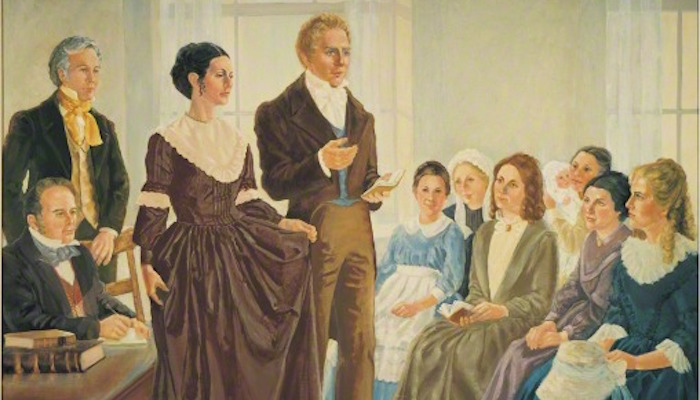
This section is directed at Emma, with a lot of focus on her supporting Joseph, but there is also something very meaningful to me. Emma was ordained to expound scriptures and to exhort the Church (25:7) and Joseph was to support her in the Church (25:9). She was also called by God as an “elect lady” and given an office. “The office of thy calling shall be for a comfort unto my servant, Joseph Smith” (24:5). Now perhaps this is simply a difference in early church language versus the “setting apart” language we hear today, but it felt unique to me and worth noting.
Section 84
Much of section 84 is directed towards men and the line of the priesthood—the greater priesthood, and the lesser priesthood. One thing that was meaningful to me as I read this was the term the “seed of Abraham,” rather than the “sons of Abraham” as specified for Moses and Aaron. Why is Abraham different?
“They become the sons of Moses and of Aaron and the seed of Abraham, and the church and kingdom, and the elect of God” (D&C 84:34).
According to the Bible dictionary the Seed of Abraham is:
The heirs of the promises and covenants made to Abraham and obtained only by obedience to the laws and ordinances of the gospel of Jesus Christ. Men and women become heirs by faithfulness to covenant obligations whether they are literally of Abraham’s lineage or by adoption.
Another notable section of verses is directed at the apostles, and it then lists signs of those who believe upon the words of the apostles. It does not say those who receive the priesthood—it is not limited to men, these are signs that follow all who believe:
That every soul who believeth on your words, and is baptized by water for the remission of sins, shall receive the Holy Ghost. And these signs shall follow them that believe—In my name they shall do many wonderful works; In my name they shall cast out devils; In my name they shall heal the sick; In my name they shall open the eyes of the blind, and unstop the ears of the deaf; And the tongue of the dumb shall speak; And if any man shall administer poison unto them it shall not hurt them; And the poison of a serpent shall not have power to harm them (D&C 84:64-72).
In Mark 16, Jesus also gives this directive to his Apostles, to go into all the world and preach the gospel to every creature. And Jesus lists the signs that will follow those who believe: they shall cast out devils, speak in tongues, and lay hands on the sick and heal them.
Section 107
It is interesting to me that the sisters were asked to read section 107. Women are not mentioned specifically in this section. Latter-day Saint scholar Steven Harper said, “Section 107 gives ordinary, even inadequate men both duty and destiny that can motivate them to rise to far greater heights of service to God and family than they would if left to their natural inclinations.” Which is wonderful, but what does this section mean for me? Why do I need to read this now? This section is all about men, or is it?
In 100 verses, the term man or men is referenced in the following ways:
16 No man has a legal right to this office (bishopric) to hold the keys of this priesthood, except he be a literal descendant of Aaron.
29 The quorum of three presidents…were righteous and holy men.
40 The order of this priesthood was confirmed to be handed down from father to son, and rightly belongs to the literal descendants of the chosen seed, to whom the promises were made.
43 (Seth) was a perfect man
99 Wherefore, now let every man learn his duty, and to act in the office in which he is appointed, in all diligence.
With a deeper resolve to discover what this section means to me, I read it with a new and prayerful perspective to discover how I could relate to this section as a woman. I sought to find meaning in the differences in the language. Does the priesthood rightly belong to all literal and adopted descendants of the chosen seed? Reading these verses gave me a loving feeling of comfort.
The power and authority of the higher, or Melchizedek Priesthood, is to hold the keys of all the spiritual blessings of the church—To have the privilege of receiving the mysteries of the kingdom of heaven, to have the heavens opened unto them, to commune with the general assembly and church of the Firstborn, and to enjoy the communion and presence of God the Father, and Jesus the mediator of the new covenant. (D&C 107:18-19)
There are familiar words here. There are phrases here that give me the same peace as the words of the endowment and that reassurance that I too have a place. There are ways these words apply to me. I have a newly gained perspective and insight from seeking to better understand these sections of the Doctrine and Covenants. Maybe there will be no changes this conference. Maybe the only thing that changes this conference is me.
Conclusion
In 1978 Elder Neal A. Maxwell said, “We know so little, brothers and sisters, about the reasons for the division of duties between womanhood and manhood as well as between motherhood and priesthood. These were divinely determined in another time and another place. We are accustomed to focusing on the men of God because theirs is the priesthood and leadership line. But paralleling that authority line is a stream of righteous influence reflecting the remarkable women of God who have existed in all ages and dispensations, including our own. Greatness is not measured by coverage in column inches, either in newspapers or in the scriptures. The story of the women of God, therefore, is, for now, an untold drama within a drama…”
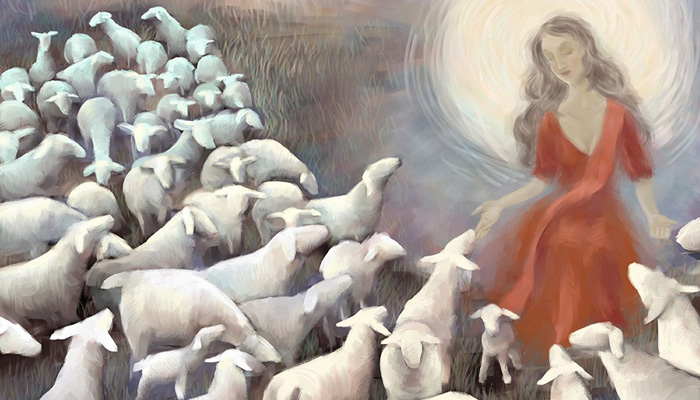
“When we return to our real home, it will be with the ‘mutual approbation’ of those who reign in the ‘royal courts on high.’ There we will find beauty such as mortal ‘eye hath not seen’; we will hear sounds of surpassing music which mortal ‘ear hath not heard.’ Could such a regal homecoming be possible without the anticipatory arrangements of a Heavenly Mother?”
What will the story of the women of God be from the April 2020 General Conference?





